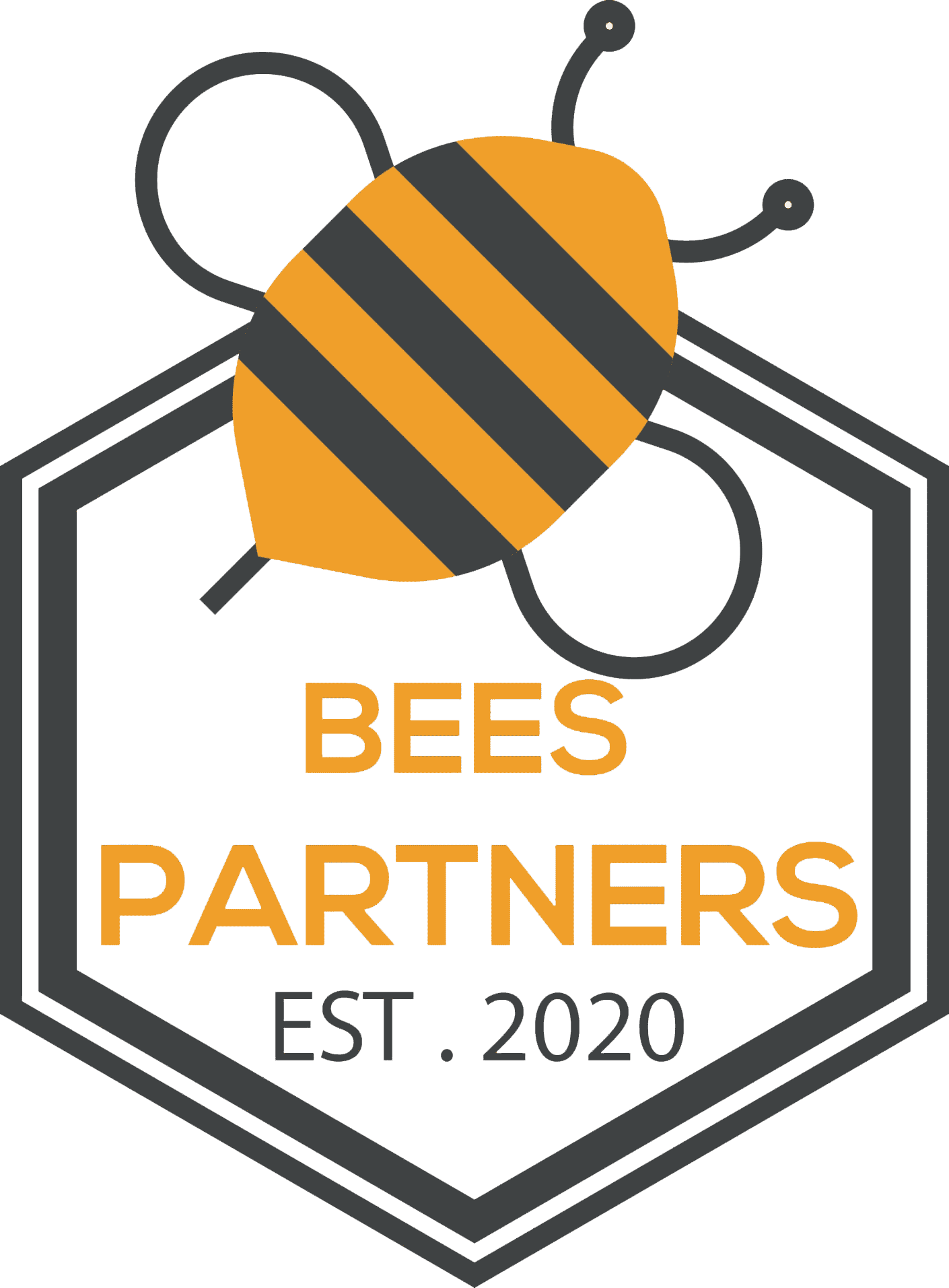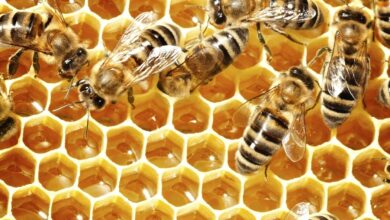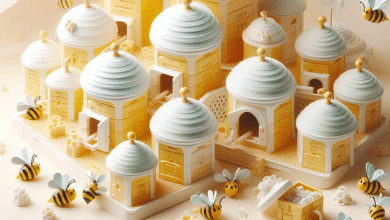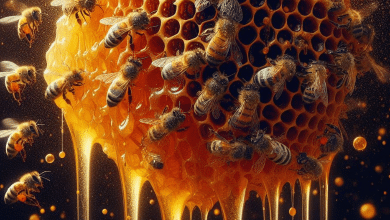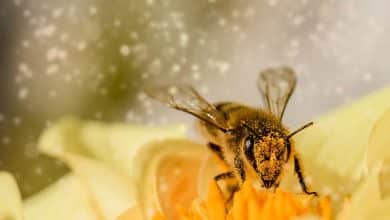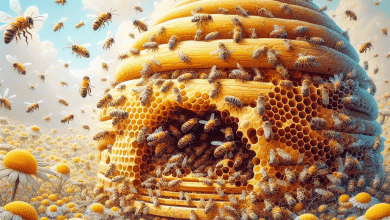Inside the Largest Honey Bee Farm in NYC

The Largest Honey Bee Farm in NYC, located at the Queens County Farm Museum, is an impressive and innovative project that aims to promote urban beekeeping and sustain the honey bee population in the city. In collaboration with Cornell University’s Dyce Lab for Honey Bee Studies and Andrew Coté of Andrew’s Honey, this farm has created the largest single apiary in New York City.
With a history dating back to 1697, the Queens County Farm Museum is not only the largest tract of farmland in NYC but also one of the longest continually farmed sites in New York State. It has a rich heritage of honey bee pollination, which this new project continues. Currently housing thirty colonies, the apiary will eventually hold 50 beehives, providing a home for over two million bees.
This exceptional partnership between the farm, Cornell University, and Andrew Coté will result in the creation of a comprehensive curriculum, exhibition, and demonstration site. This will serve as a model for teaching, learning, research, pollination, and honey production on an unmatched scale within New York City.
By establishing this large-scale apiary, the farm aims to educate the community about the importance of honey bees and their role in pollination. Furthermore, they strive to showcase sustainable beekeeping practices and their positive impact on the environment. In doing so, they hope to inspire and engage the public in environmental stewardship.
As the largest honey bee farm in NYC, this project represents a significant milestone in urban beekeeping and biodiversity conservation efforts. It sets an example for other urban environments to follow, emphasizing the crucial role that honey bees play in maintaining a healthy ecosystem. The future prospects and expansion plans for this honey bee farm are promising, offering hope for continued growth and sustainability in metropolitan areas.
Overview of the Largest Honey Bee Farm in NYC
The Largest Honey Bee Farm in NYC, located at the Queens County Farm Museum, is a remarkable project that aims to promote urban beekeeping and support the honey bee population in the city. In collaboration with Cornell University’s Dyce Lab for Honey Bee Studies and Andrew Coté of Andrew’s Honey, this farm has established the largest single apiary in New York City.
With a history dating back to 1697, the Queens County Farm Museum is not only the largest tract of farmland in NYC but also one of the longest continually farmed sites in New York State. The farm has a rich heritage of honey bee pollination, which this new project continues. Currently housing thirty colonies, the apiary will eventually hold 50 beehives, providing a home for over two million bees.
This exceptional partnership between the farm, Cornell University, and Andrew Coté has resulted in the creation of a comprehensive curriculum, exhibition, and demonstration site. This serves as a model for teaching, learning, research, pollination, and honey production on an unmatched scale within New York City.
By establishing this large-scale apiary, the farm aims to educate the community about the importance of honey bees and their role in pollination. They also strive to showcase sustainable beekeeping practices and their positive impact on the environment. In doing so, they hope to inspire and engage the public in environmental stewardship.
As the largest honey bee farm in NYC, this project represents a significant milestone in urban beekeeping and biodiversity conservation efforts. It sets an example for other urban environments to follow, emphasizing the crucial role that honey bees play in maintaining a healthy ecosystem.
The future prospects and expansion plans for this honey bee farm are promising, offering hope for continued growth and sustainability in metropolitan areas. With its dedication to education, research, and sustainable practices, the Largest Honey Bee Farm in NYC is truly a beacon of environmental stewardship and an important contributor to the conservation of honey bees.
History and significance of urban beekeeping in NYC
Urban beekeeping in New York City has a rich history and holds significant importance in the context of urban agriculture and environmental conservation. The practice of beekeeping in the urban landscape dates back several decades, with a resurgence in recent years due to increased awareness about the critical role honey bees play in pollination and ecosystem health.
In the early 2000s, beekeeping regulations were relaxed in NYC, allowing more residents to keep bees in their urban spaces. This policy change led to an increase in the number of beekeepers and the establishment of beekeeping associations and organizations dedicated to promoting beekeeping and supporting honey bee populations.
The significance of urban beekeeping in NYC lies in its contribution to pollination, food production, and biodiversity conservation. Honey bees are essential pollinators for both wildflowers and crops, including many fruits and vegetables grown in the city. Through their pollination services, honey bees enhance urban agriculture, leading to increased crop yields and healthier ecosystems.
Furthermore, urban beekeeping provides an opportunity for city dwellers to reconnect with nature and learn about the intricate workings of a beehive. Beekeeping education programs and workshops offered by beekeeping associations and farms like the Queens County Farm Museum apiary help raise awareness about the importance of honey bees and sustainable beekeeping practices.
In addition to the educational benefits, urban beekeeping contributes to local honey production. Urban honey, often referred to as “city honey,” is unique in flavor and character as it captures the essence of the local flora within the cityscape.
Overall, urban beekeeping in NYC reflects a growing movement of environmental stewardship and sustainable living. It showcases the city’s commitment to biodiversity conservation, food security, and creating a greener, more resilient urban environment. With the largest honey bee farm in NYC as a shining example, urban beekeeping continues to thrive and inspire further conservation efforts in metropolitan areas worldwide.
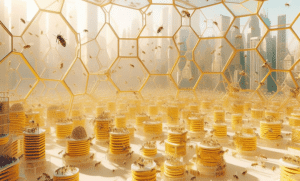
Beekeeping Practices at the Honey Bee Farm
At the largest honey bee farm in NYC, beekeeping practices are carefully implemented to ensure the health and productivity of the honey bee colonies. Here are some key aspects of the beekeeping practices at the farm:
- Beehive maintenance: The beekeepers regularly inspect and maintain the beehives to ensure they are clean, free from pests and diseases, and provide a suitable environment for the bees to thrive. This includes checking for brood health, queen productivity, and colony strength.
- Feeding and nutrition: The farm provides supplementary feeding to the bees when necessary, especially during periods when nectar and pollen sources may be limited. This helps to ensure that the bees have sufficient food to sustain their colonies and support honey production.
- Integrated Pest Management (IPM): The beekeepers at the farm practice IPM techniques to manage pests and diseases that can affect honey bee colonies. This includes monitoring for pests such as varroa mites and implementing treatment strategies to keep the colonies healthy.
- Swarm prevention and management: Beekeepers take measures to prevent swarming, which is when a colony splits and a new queen is produced. This involves monitoring the colony’s population, providing adequate space within the hive, and managing the bees’ reproductive behavior.
- Selective breeding: The farm may engage in selective breeding programs to maintain desirable traits in the honey bee colonies, such as gentleness, productivity, and resistance to diseases. This helps to ensure the long-term health and adaptability of the bees.
By following these beekeeping practices, the farm aims to create a sustainable and thriving honey bee population while also producing high-quality honey and other bee-related products. The attention to detail and commitment to best beekeeping practices contribute to the overall success of the largest honey bee farm in NYC.
Honey bee species at the farm
The largest honey bee farm in NYC is home to several species of honey bees that play a vital role in pollination and honey production. The farm primarily focuses on two bee species: the Western honey bee (Apis mellifera) and the Italian honey bee (Apis mellifera ligustica).
The Western honey bee is the most common and widely recognized honey bee species. Known for their industrious nature and strong work ethic, these bees are known to produce large quantities of high-quality honey. They are also renowned for their ability to adapt to various climates and environments, making them well-suited for urban beekeeping in NYC.
The Italian honey bee, a subspecies of the Western honey bee, is highly prized for its gentle temperament and productivity. These bees are known for their bright yellow coloration and excellent honey production. They are also relatively less prone to swarming, making them easier to manage for beekeepers.
Both the Western honey bee and Italian honey bee are known for their strong foraging capabilities, allowing them to collect nectar and pollen from a wide variety of flowering plants. This diversity in foraging behavior contributes to the flavorful and unique characteristics of the honey produced at the farm.
Overall, the inclusion of multiple honey bee species at the largest honey bee farm in NYC ensures a dynamic and resilient bee population. This diversity not only enhances honey production but also promotes a healthy ecosystem and supports the farm’s commitment to sustainable beekeeping practices.
Honey production and harvesting techniques
Honey production at the largest honey bee farm in NYC is a meticulous process that involves specific techniques to ensure the extraction of high-quality honey. Once the honey bees have collected nectar from various flowering plants, the farm follows a careful process to harvest the honey.
Here are the key steps in honey production and harvesting at the farm:
- Honey Extraction: The frames from the beehives are carefully removed and transported to the extraction area. The frames are then uncapped using a hot knife or an automated uncapping machine, which removes the beeswax covering the cells.
- Honey Extraction Equipment: The uncapped frames are placed in an extractor, which uses centrifugal force to extract the honey from the frames. This allows the honey to flow out through small holes, while the frames remain intact.
- Filtering: After extraction, the honey is typically passed through a fine mesh or cheesecloth to remove any remaining impurities such as beeswax or bee parts.
- Settling: The honey is then left to settle in large settling tanks. During this time, any air bubbles or particles rise to the top, and the clean honey settles at the bottom.
- Bottling and Packaging: Once the honey has settled, it is carefully transferred to jars or containers for packaging. It is important to ensure that the containers are properly sealed to maintain the honey’s freshness and prevent it from crystallizing.
- Labeling and Storage: The jars are labeled with the farm’s branding and other necessary information, such as the honey’s origin and production date. The packaged honey is then stored in a cool, dark place to preserve its flavor and quality.
By following these precise techniques, the largest honey bee farm in NYC is able to produce a significant amount of honey each year while maintaining the highest standards of quality and taste. The farm takes pride in offering its customers the purest and most delicious honey straight from their own beehives.
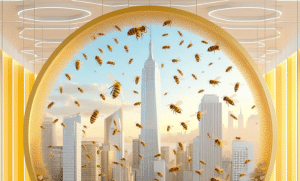
Sustainability Efforts and Environmental Impact
The largest honey bee farm in NYC is committed to sustainability and minimizing its environmental impact. With a deep understanding of the crucial role honey bees play in pollination, the farm implements various practices to protect the environment and promote sustainable beekeeping.
One of the farm’s primary sustainability efforts is promoting and protecting pollinator-friendly habitats. They prioritize planting a diverse range of flowering plants, ensuring a continuous food source for their bees throughout the year. This not only supports the health and well-being of the honey bees but also contributes to the overall biodiversity of the area.
To minimize chemical exposure, the farm practices organic beekeeping, avoiding the use of synthetic pesticides and antibiotics. This approach is beneficial not only for the bees but also for the health of the surrounding ecosystem.
Furthermore, the farm implements careful hive management practices that prioritize bee health and well-being. This includes regular monitoring and inspections to identify and address any potential health issues promptly. By maintaining strong and healthy bee colonies, the farm can contribute to the overall resilience and vitality of the local honey bee population.
The farm also actively educates visitors and the local community about the importance of honey bees and their impact on the environment. Through workshops and educational tours, they aim to raise awareness about the essential role honey bees play in pollination and the need to protect their habitats.
In total, the sustainability efforts of the largest honey bee farm in NYC contribute to preserving and enhancing the local ecosystem. By prioritizing the health and well-being of the honey bees and promoting pollinator-friendly practices, they play a vital role in safeguarding both the environment and the future of urban beekeeping.
Role of honey bees in pollination
Honey bees play a crucial role in pollination, making them vital to the overall health and biodiversity of our ecosystems. As they forage for nectar and pollen, honey bees transfer pollen from the male part of a flower (the stamen) to the female part (the stigma) of another flower, facilitating fertilization and seed production. This process, known as cross-pollination, is essential for the reproduction of many flowering plants, including fruits, vegetables, and nuts.
The impact of honey bee pollination extends far beyond the agricultural sector. It is estimated that one-third of the world’s food production depends on pollinators, with honey bees being the most significant contributors. They ensure the reproduction of plants that provide food for both humans and wildlife and contribute to the maintenance of plant biodiversity.
Not only do honey bees enhance crop yield and quality, but they also improve the genetic diversity of plant populations, making them more resilient to environmental stresses such as climate change and disease. Their pollination services are particularly crucial for crops that rely heavily on insect pollination, such as almonds, apples, and blueberries.
In urban areas like New York City, honey bees play a vital role in maintaining green spaces and supporting urban agriculture. By pollinating flowers in gardens, parks, and rooftop farms, they contribute to the beauty and sustainability of the urban environment.
The largest honey bee farm in NYC recognizes the importance of honey bees as pollinators and strives to protect their habitats and promote sustainable beekeeping practices. By doing so, they contribute not only to the health and survival of honey bees but also to the resilience and well-being of our ecosystems as a whole.
Farm’s sustainability practices and impact on the environment
The largest honey bee farm in NYC is committed to implementing sustainable practices that minimize its impact on the environment. These efforts help protect the delicate balance of ecosystems and promote the long-term health and well-being of honey bees and other pollinators.
One key sustainability practice at the farm is the use of organic farming methods. This means that no synthetic pesticides or chemical fertilizers are used on the crops. Instead, natural and organic alternatives are employed to control pests and enhance soil fertility. By avoiding the use of harmful chemicals, the farm ensures that the honey bees and other beneficial insects are not exposed to these toxins, thereby maintaining a healthy and thriving ecosystem.
Additionally, the farm follows responsible water management practices. They employ efficient irrigation systems that minimize water waste and utilize rainwater harvesting techniques. By conserving water resources, the farm reduces its impact on local water supplies and helps ensure the availability of clean water for both the honey bees and surrounding wildlife.
Furthermore, the farm practices responsible waste management by implementing recycling and composting systems. They properly dispose of agricultural waste and utilize composted organic matter as a natural fertilizer, reducing the need for synthetic alternatives. This not only helps reduce landfill waste but also improves soil health and promotes sustainable farming practices.
The farm’s sustainability practices have a positive impact on the environment. By avoiding the use of synthetic pesticides and fertilizers, they prevent water and soil pollution, safeguarding local ecosystems. The responsible water management practices help conserve this valuable resource, and the recycling and composting systems minimize waste and contribute to a circular and sustainable economy.
Overall, the largest honey bee farm in NYC demonstrates a strong commitment to sustainability, promoting the health of honey bees, protecting the environment, and serving as a model for responsible farming practices.
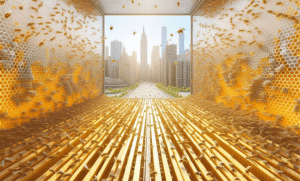
Educational Programs and Community Engagement
The largest honey bee farm in NYC is not just a place for honey production, but also serves as a hub for educational programs and community engagement. Through various initiatives, the farm aims to raise awareness about the importance of honey bees and their role in pollination, as well as promote sustainable farming practices.
One of the key educational programs offered at the farm is workshops. These workshops cover a range of topics such as beekeeping basics, honey extraction techniques, and the role of honey bees in food production. Participants have the opportunity to learn from experienced beekeepers and gain hands-on experience in managing beehives. These workshops are open to both beginners and experienced beekeepers, providing a platform for knowledge-sharing and skill development.
In addition to workshops, the farm also offers educational tours. These tours give visitors a behind-the-scenes look at the honey production process and the inner workings of a beehive. Tour guides provide insightful information about the life cycle of honey bees, their crucial role as pollinators, and the importance of protecting their habitats. These tours provide a unique and interactive learning experience for students, families, and individuals interested in the world of honey bees.
The farm also actively engages with the community through partnerships and outreach activities. They collaborate with local schools and community organizations to organize educational events, such as honey tasting sessions and beekeeping demonstrations. These initiatives not only raise awareness about the importance of honey bees but also foster a sense of environmental stewardship and community involvement.
Overall, the largest honey bee farm in NYC is dedicated to educating the public about honey bees and promoting sustainable farming practices. Through their educational programs, tours, and community partnerships, they inspire and empower individuals to become advocates for honey bees and environmental conservation. The farm’s commitment to education and community engagement is crucial in ensuring a sustainable future for honey bees and the ecosystem they support.
Workshops and educational tours offered at the farm
The largest honey bee farm in NYC offers a wide range of workshops and educational tours to engage and educate the community. These programs are designed to raise awareness about honey bees, their importance in pollination, and promote sustainable farming practices.
The workshops cover various topics related to beekeeping. Beginners and experienced beekeepers alike can learn about beekeeping basics, honey extraction techniques, and the role of honey bees in food production. Led by experienced beekeepers, these workshops provide valuable knowledge and hands-on experience in managing beehives.
Educational tours are also available at the farm, allowing visitors to get a behind-the-scenes look at honey production and the inner workings of a beehive. Tour guides provide insightful information about the life cycle of honey bees, their crucial role as pollinators, and the importance of protecting their habitats. These tours offer a unique and interactive learning experience for students, families, and individuals interested in the world of honey bees.
Through these workshops and tours, the farm fosters a sense of curiosity and appreciation for honey bees and sustainable farming. Participants have the opportunity to learn from experts, ask questions, and gain a deeper understanding of the significance of honey bees in our ecosystem.
In addition to workshops and tours, the farm also collaborates with local schools and community organizations to organize educational events such as honey tasting sessions and beekeeping demonstrations. These initiatives not only raise awareness about honey bees but also encourage community involvement and environmental stewardship.
By offering workshops, educational tours, and community engagement activities, the largest honey bee farm in NYC is playing a vital role in educating the public and inspiring them to become advocates for honey bees and sustainable farming practices.
Community partnerships and outreach activities
The largest honey bee farm in NYC recognizes the importance of community involvement and collaboration in promoting awareness about honey bees and sustainable farming practices. Through strategic partnerships with local schools and community organizations, the farm has developed a range of outreach activities to engage and educate the public.
One example of these partnerships is the collaboration with nearby schools to organize field trips and educational events. Students have the opportunity to visit the farm, participate in hands-on activities, and learn about the role of honey bees in our food system. These interactive experiences not only stimulate curiosity but also encourage young minds to become advocates for honey bees and environmental conservation.
Additionally, the farm works closely with community organizations to host events such as honey tasting sessions and beekeeping demonstrations. These events provide an enjoyable and educational experience for individuals of all ages. Participants can taste different varieties of honey, learn about the art of beekeeping, and gain a deeper understanding of the intricate relationship between honey bees and our ecosystem.
Through these community partnerships and outreach activities, the largest honey bee farm in NYC aims to foster a sense of environmental stewardship and inspire individuals to make conscious choices that support the well-being of honey bees and our planet. By coming together as a community, we can create a more sustainable future for honey bees and ensure the vitality of our food systems.
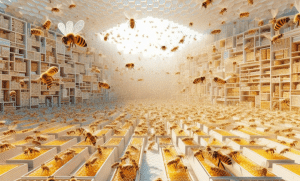
Beehive Technology and Innovations
Beehive technology and innovations play a crucial role in the success of the largest honey bee farm in NYC. The farm utilizes modern advancements to create optimal conditions for honey bee colonies, enhance productivity, and ensure the well-being of the bees.
One of the innovative hive designs used at the farm is the top bar hive. This design allows for natural comb building, giving the bees the freedom to construct their honeycombs according to their needs and preferences. Top bar hives also facilitate easier hive inspections and honey harvesting.
In addition, the farm incorporates technology to monitor bee health and behavior. Hive sensors and monitoring systems are used to track factors such as temperature, humidity, and hive weight. This data provides valuable insights into the overall health of the colonies and helps detect any potential issues or diseases early on. It also allows beekeepers to make informed decisions regarding hive management and intervention, ensuring the best possible care for the bees.
Furthermore, the farm employs techniques such as queen rearing and selective breeding to develop strong and resilient honey bee populations. By selecting for desirable traits such as disease resistance, honey production, and gentle behavior, the farm aims to create robust colonies that can thrive in urban environments.
Overall, the integration of beehive technology and innovations at the largest honey bee farm in NYC showcases a commitment to sustainable and responsible beekeeping practices. By providing optimal conditions and utilizing modern advancements, this farm sets an example for the beekeeping community and promotes the long-term viability of urban honey bee populations.
Innovative hive designs used at the farm
The largest honey bee farm in NYC prides itself on utilizing innovative hive designs that promote optimal conditions for honey bee colonies. One of the unique hive designs employed at the farm is the top bar hive. This design allows for natural comb building, giving the bees the freedom to construct their honeycombs according to their needs and preferences. Unlike traditional hive designs with pre-formed frames, top bar hives provide a more natural and flexible environment for the bees.
Top bar hives also offer several other advantages. Firstly, they make hive inspections and honey harvesting easier for beekeepers. The removable bars at the top of the hive allow for convenient access and minimal disruption to the colony. This ensures that the bees can continue their activities undisturbed. Secondly, top bar hives facilitate better ventilation, reducing the risk of overheating or moisture build-up within the hive.
Additionally, the farm incorporates modern technology into the hives to monitor bee health and behavior. Hive sensors and monitoring systems track vital factors such as temperature, humidity, and hive weight. This data helps beekeepers gain valuable insights into the overall health of the colonies and detect any potential issues or diseases early on. By using these technological advancements, the farm ensures the best possible care for the bees and fosters their well-being.
Overall, the innovative hive designs and integration of technology at the largest honey bee farm in NYC demonstrate a commitment to sustainable and responsible beekeeping practices. By providing a more natural and adaptable environment for the bees, these hive designs promote colony health and productivity. Coupled with advanced monitoring systems, these innovations contribute to fostering strong and thriving honey bee populations in the urban setting of NYC.
Technology to monitor bee health and behavior
The largest honey bee farm in NYC utilizes advanced technology to monitor the health and behavior of its bee colonies. By employing innovative tools and systems, beekeepers are able to gain valuable insights into the well-being of the bees and detect any potential issues or diseases early on.
One of the key technologies used is the installation of hive sensors. These sensors are strategically placed within the beehives to collect data on vital factors such as temperature, humidity, and hive weight. By continuously monitoring these parameters, beekeepers can track the overall health and activity of the colonies. For example, changes in temperature or humidity levels could indicate the presence of diseases or stress within the hive. Additionally, monitoring hive weight helps identify when the honey production is at its peak and when it’s time for honey harvesting.
Furthermore, the farm employs monitoring systems that integrate the data collected from the hive sensors. These systems allow beekeepers to visualize and analyze the information in real-time. Through data analytics and machine learning algorithms, they can identify patterns, trends, and abnormal behaviors that may require immediate attention. This technological approach not only enhances the efficiency of managing the colonies but also provides a proactive approach to beekeeping by preventing potential threats or diseases.
By utilizing such advanced monitoring technology, the largest honey bee farm in NYC ensures the best possible care for its bees. The precise and continuous monitoring of bee health and behavior contributes to maintaining strong and thriving honey bee populations in the urban setting. The data-driven insights acquired through these innovative tools play a crucial role in promoting the well-being and sustainability of honey bee colonies at the farm.
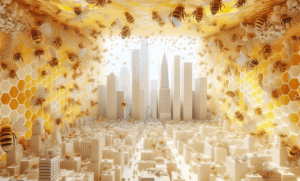
Conclusion honey bee farm
In conclusion, the largest honey bee farm in NYC represents a significant milestone in urban beekeeping, showcasing the immense potential for sustainable farming practices within a bustling metropolis. The farm’s dedication to creating a thriving environment for honey bees not only ensures a bountiful honey production but also plays a crucial role in supporting local ecosystems and biodiversity.
By establishing a state-of-the-art apiary and utilizing innovative beehive technology, the farm demonstrates a commitment to the well-being and health of the honey bee colonies. The integration of hive sensors and advanced monitoring systems allows beekeepers to closely monitor the vital parameters and behavior of the bees, resulting in early detection of any issues or diseases and preemptive measures to safeguard the colonies’ health.
Furthermore, the farm’s sustainability efforts and commitment to environmental stewardship exemplify a holistic approach to beekeeping. Recognizing the pivotal role of honey bees in pollination, the farm actively promotes the importance of these vital insects in maintaining flourishing agricultural systems and the overall health of the ecosystem.
Through educational programs, workshops, and community engagement, the farm not only raises awareness about the significance of honey bees but also actively involves the local community in conservation efforts. By fostering partnerships and outreach activities, the farm becomes a hub for fostering environmental consciousness and promoting sustainable practices.
Looking ahead, the largest honey bee farm in NYC showcases the potential for the expansion of urban beekeeping and the creation of more sustainable farming models. It serves as an inspiration for other urban areas to embrace beekeeping as a means to support biodiversity, enhance food production, and bring communities together in a shared commitment to a greener future. As the farm continues to grow and innovate, it sets the stage for the continued success and impact of urban beekeeping in NYC and beyond.
Importance of urban beekeeping for biodiversity in NYC
Urban beekeeping plays a crucial role in supporting biodiversity in NYC. Honey bees, as key pollinators, are essential for the reproduction of plants and the maintenance of diverse ecosystems. The largest honey bee farm in NYC contributes significantly to the preservation of biodiversity by providing a thriving habitat for honey bees in an urban environment.
The presence of honey bees in urban areas helps to pollinate a wide variety of flowering plants, including trees, shrubs, and gardens, leading to the production of fruits, vegetables, and seeds. This, in turn, supports the growth of plant populations and allows for the continuation of vital food chains in the ecosystem.
Furthermore, the diversity of plants in urban areas is enhanced by the presence of honey bees. As honey bees forage for nectar and pollen, they inadvertently spread pollen from one plant to another, promoting cross-pollination and the production of genetically diverse offspring.
The increased biodiversity resulting from urban beekeeping has numerous benefits. It supports the preservation of native plant species, helps to control invasive species by promoting natural competition, and provides habitats for other wildlife such as birds and insects.
Moreover, urban beekeeping fosters a connection between humans and the natural world. It raises awareness about the importance of pollinators and empowers individuals to take action to protect and support biodiversity in their own communities.
By embracing urban beekeeping and supporting initiatives like the largest honey bee farm in NYC, residents can actively contribute to the preservation and enhancement of biodiversity in the city. This not only ensures a sustainable future for honey bees but also promotes a healthier and more resilient urban ecosystem.
Future prospects and expansion plans for the largest honey bee farm in NYC
The largest honey bee farm in NYC, located at the Queens County Farm Museum, has exciting future prospects and ambitious expansion plans. With its successful partnership with Cornell University’s Dyce Lab for Honey Bee Studies and Andrew Coté of Andrew’s Honey, the farm aims to continue its legacy of honey bee pollination and make significant contributions to the beekeeping community in the city.
One of the key future prospects is to further develop the educational programs and community engagement initiatives at the farm. The farm plans to expand its workshops and educational tours, offering even more opportunities for individuals and groups to learn about beekeeping, pollination, and honey production. By providing these educational experiences, the farm aims to raise awareness about the importance of honey bees and inspire more people to get involved in sustainable beekeeping practices.
In terms of expansion plans, the farm has set a goal to increase its number of beehives from the current 30 colonies to 50 beehives. This expansion will provide a larger habitat for bees and further contribute to the pollination efforts in the area. Additionally, the farm plans to enhance its infrastructure by implementing innovative hive designs and utilizing technology to monitor bee health and behavior.
The expansion of the largest honey bee farm in NYC not only supports the preservation of biodiversity but also strengthens the farm’s role as a leader in sustainable beekeeping practices. By promoting pollination, honey production, and community engagement, the farm is paving the way for a more resilient urban ecosystem that benefits both humans and wildlife.
As the largest honey bee farm in NYC continues to grow and innovate, it will undoubtedly influence and inspire other beekeepers and urban farms to prioritize the well-being of honey bees and their vital role in supporting biodiversity. Through its efforts, the farm is shaping the future of urban beekeeping and creating a greener and more sustainable city for generations to come.
Thank you for buzzing through our exploration of the amazing Queens Farms apiary — the single largest one in the Big Apple, teeming with over 2 million honey bees. We hope you’ve gained some sweet insights into this incredible operation, its partnership with Cornell University’s Dyce Lab for honey bee farm Studies, NYC’s Andrew’s Honey, and how it’s buzzing the farm into a new era of pollination and honey production. If this stirred your curiosity or you’re just craving more honeyed facts, feel free to visit the honey bee farm and get an up-close and personal view of the bees at work in their observation hive. Don’t forget to leave your thoughts and questions below; we’re eager to hear what part of this hive of activity has captured your imagination the most!
